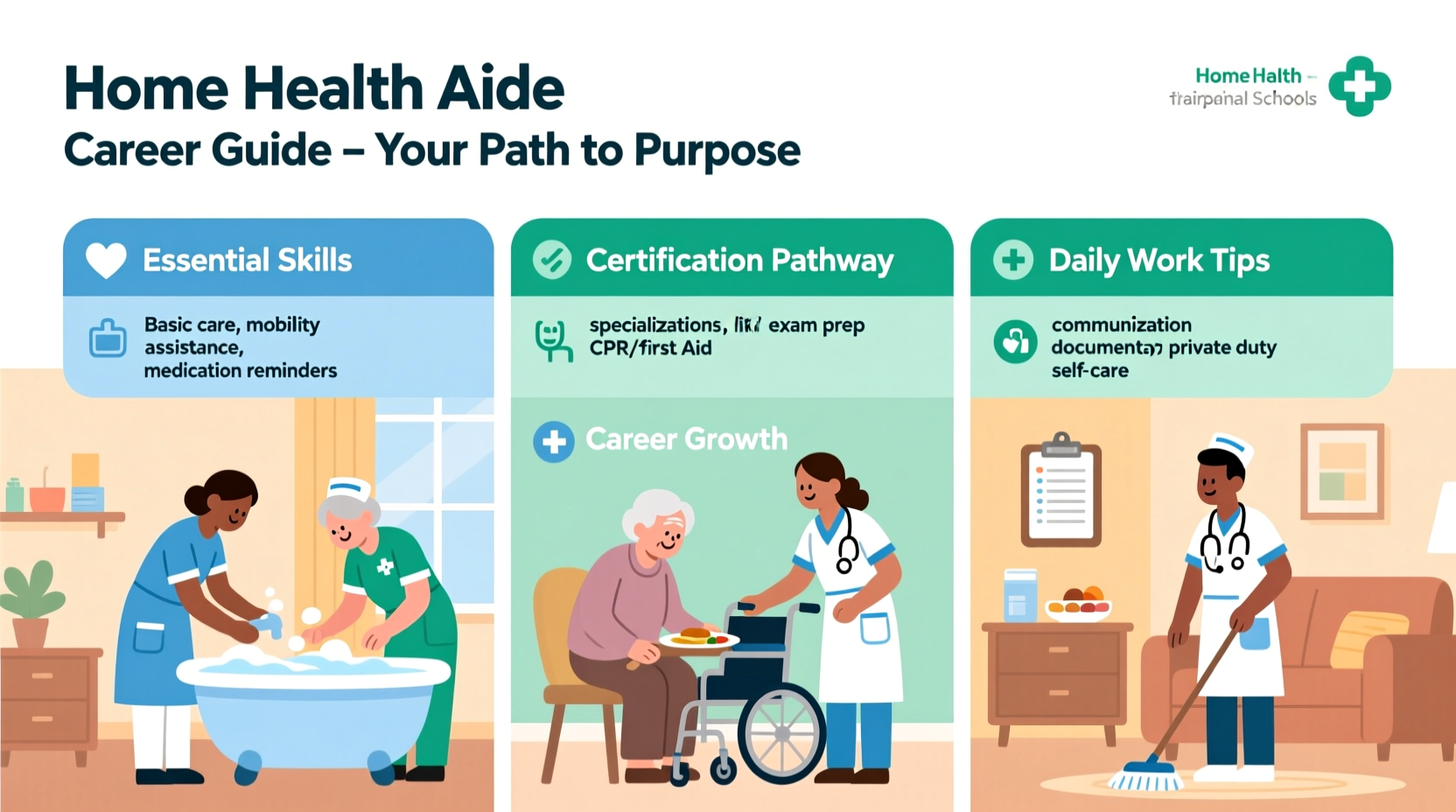As the population ages and healthcare evolves, demand for compassionate, skilled home health aides continues to rise. These professionals play a vital role in supporting individuals with chronic illnesses, disabilities, or aging-related challenges in the comfort of their own homes. Becoming a home health aide (HHA) is not only a rewarding career path but also an accessible entry point into the healthcare field. This guide walks you through the necessary skills, training requirements, certification process, and practical career strategies to build a successful future as a home health aide.
Understanding the Role of a Home Health Aide

A home health aide provides non-medical assistance and personal care to clients who need help managing daily activities. Unlike nurses or therapists, HHAs do not administer medication or perform clinical procedures. Instead, they focus on enhancing quality of life through hands-on support. Common responsibilities include:
- Assisting with bathing, dressing, grooming, and toileting
- Helping with mobility and transfers (e.g., from bed to wheelchair)
- Preparing meals and monitoring nutritional intake
- Light housekeeping, including laundry and dishwashing
- Running errands such as grocery shopping or picking up prescriptions
- Companionship and emotional support
- Monitoring vital signs under supervision (in some states and agencies)
The role requires empathy, patience, physical stamina, and strong communication skills. Most importantly, it demands a genuine desire to help others live with dignity and independence.
Essential Skills Every Home Health Aide Must Develop
While formal training covers many technical aspects, long-term success depends on mastering both hard and soft skills. The most effective HHAs combine professional knowledge with interpersonal excellence.
Core Competencies
| Skill | Description | Why It Matters |
|---|---|---|
| Infection Control | Proper handwashing, use of PPE, sanitizing surfaces | Prevents illness spread, especially critical for immunocompromised clients |
| Basic First Aid & CPR | Responding to falls, choking, or sudden health changes | Can save lives during emergencies before medical help arrives |
| Observation & Reporting | Noticing changes in mood, appetite, skin condition, or behavior | Enables early intervention by nurses or doctors |
| Communication | Clear updates to supervisors and empathetic interaction with clients | Ensures continuity of care and builds trust |
| Time Management | Punctuality, efficient task completion, documentation | Maintains schedule integrity across multiple clients |
“Empathy isn’t just a soft skill—it’s a clinical tool. When patients feel heard, they’re more likely to share symptoms that could indicate serious issues.” — Dr. Linda Reyes, Geriatric Care Coordinator
Step-by-Step Guide to Training and Certification
Becoming a certified home health aide involves structured education, hands-on practice, and official credentialing. While exact requirements vary by state, this general timeline applies in most U.S. regions.
- Meet Basic Eligibility Requirements: Be at least 18 years old, have a high school diploma or GED, pass a background check, and provide proof of immunizations (including TB test).
- Enroll in a State-Approved Training Program: Programs typically last 75–120 hours and are offered through community colleges, vocational schools, or home care agencies. Courses cover safety, hygiene, nutrition, communication, and emergency procedures.
- Complete Clinical Hours: Gain supervised experience providing care in real-world settings, often in assisted living facilities or private homes.
- Pass a Competency Evaluation: Demonstrate skills like proper lifting techniques, infection control, and patient communication in a practical exam.
- Obtain Certification: Upon passing, you’ll be listed in your state’s Nurse Aide Registry (if applicable) or receive a Home Health Aide Certificate.
- Apply for Jobs: Work independently, through agencies, or in hospice and home care organizations.
Real-World Example: Maria’s Journey to Becoming an HHA
Maria, a single mother from Phoenix, transitioned from retail work to home health care after her grandmother struggled with Alzheimer’s. Witnessing the compassion of her grandmother’s aide inspired her to pursue certification. She enrolled in a 90-hour evening program while working part-time, completed her clinical rotation at a local senior residence, and passed her competency exam within four months.
Her first job was with a home care agency serving elderly clients in suburban neighborhoods. Initially nervous, she quickly built confidence by applying what she’d learned—using transfer belts safely, preparing diabetic-friendly meals, and documenting changes in alertness. Within a year, she earned recognition as “Caregiver of the Quarter” and began mentoring new aides. Today, Maria is pursuing a CNA license to expand her career options.
Maria’s story reflects a common path: personal motivation, structured training, on-the-job growth, and upward mobility.
Career Tips for Long-Term Success
Starting as a home health aide opens doors—but how you grow determines your trajectory. Consider these proven strategies to thrive in this field.
✅ Checklist: Build a Strong Foundation as an HHA
- Keep your certification current with required continuing education
- Maintain accurate, timely client notes and logs
- Dress professionally and arrive punctually for every shift
- Ask questions when unsure—never guess about care procedures
- Invest in comfortable, supportive footwear for long days on your feet
- Build rapport with clients and families through active listening
- Stay updated on elder care trends and safety protocols
Advance Your Career
Many HHAs use their experience as a springboard to higher-level roles. With additional training, you can become a Certified Nursing Assistant (CNA), Licensed Practical Nurse (LPN), or even a Registered Nurse (RN). Others specialize in dementia care, hospice support, or pediatric home care.
Networking matters. Join professional groups like the National Association for Home Care & Hospice (NAHC) or attend local caregiver workshops. These connections can lead to better-paying jobs, mentorship, and scholarship opportunities.
Frequently Asked Questions
How much does a home health aide earn?
The median hourly wage for HHAs in the U.S. is $15.50, according to the Bureau of Labor Statistics (2023). Wages vary by location, employer, and experience. Some agencies offer benefits like health insurance, mileage reimbursement, or paid training.
Is certification required in all states?
No. While most states require formal training and testing, a few allow on-the-job training under supervision. However, being certified increases employability and trust with clients and agencies.
Can I work independently without an agency?
Yes. Many HHAs find private clients through word-of-mouth, online platforms, or caregiver directories. Independent work offers flexibility but requires self-marketing, scheduling, and handling contracts and payments.
Final Thoughts: Start Making a Difference Today
Becoming a home health aide is more than a job—it’s a commitment to dignity, compassion, and human connection. The training is manageable, the entry barriers are low, and the impact you make each day is immeasurable. Whether you're starting a new career, re-entering the workforce, or seeking purpose in helping others, this profession offers stability, growth, and deep personal fulfillment.









 浙公网安备
33010002000092号
浙公网安备
33010002000092号 浙B2-20120091-4
浙B2-20120091-4
Comments
No comments yet. Why don't you start the discussion?